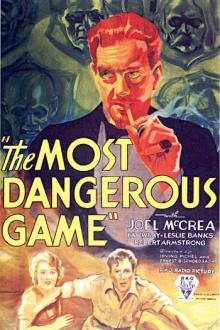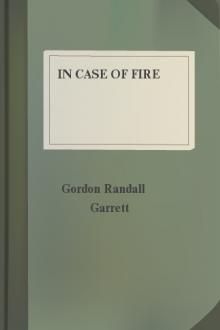The Most Dangerous Game - Richard Connell (best books to read for self development TXT) 📗

- Author: Richard Connell
- Performer: -
Book online «The Most Dangerous Game - Richard Connell (best books to read for self development TXT) 📗». Author Richard Connell
The Most Dangerous Game
by Richard Connell
“OFF THERE to the right—somewhere—is a large island,” said Whitney.” It’s rather a mystery—”
“What island is it?” Rainsford asked.
“The old charts call it `Ship-Trap Island,”’ Whitney replied.” A suggestive name, isn’t it? Sailors have a curious dread of the place. I don’t know why. Some superstition—”
“Can’t see it,” remarked Rainsford, trying to peer through the dank tropical night that was palpable as it pressed its thick warm blackness in upon the yacht.
“You’ve good eyes,” said Whitney, with a laugh,” and I’ve seen you pick off a moose moving in the brown fall bush at four hundred yards, but even you can’t see four miles or so through a moonless Caribbean night.”
“Nor four yards,” admitted Rainsford. “Ugh! It’s like moist black velvet.”
“It will be light enough in Rio,” promised Whitney. “We should make it in a few days. I hope the jaguar guns have come from Purdey’s. We should have some good hunting up the Amazon. Great sport, hunting.”
“The best sport in the world,” agreed Rainsford.
“For the hunter,” amended Whitney. “Not for the jaguar.”
“Don’t talk rot, Whitney,” said Rainsford. “You’re a big-game hunter, not a philosopher. Who cares how a jaguar feels?”
“Perhaps the jaguar does,” observed Whitney.
“Bah! They’ve no understanding.”
“Even so, I rather think they understand one thing—fear. The fear of pain and the fear of death.”
“Nonsense,” laughed Rainsford. “This hot weather is making you soft, Whitney. Be a realist. The world is made up of two classes—the hunters and the huntees. Luckily, you and I are hunters. Do you think we’ve passed that island yet?”
“I can’t tell in the dark. I hope so.”
“Why? ” asked Rainsford.
“The place has a reputation—a bad one.”
“Cannibals?” suggested Rainsford.
“Hardly. Even cannibals wouldn’t live in such a God-forsaken place. But it’s gotten into sailor lore, somehow. Didn’t you notice that the crew’s nerves seemed a bit jumpy today?”
“They were a bit strange, now you mention it. Even Captain Nielsen—”
“Yes, even that tough-minded old Swede, who’d go up to the devil himself and ask him for a light. Those fishy blue eyes held a look I never saw there before. All I could get out of him was `This place has an evil name among seafaring men, sir.’ Then he said to me, very gravely, `Don’t you feel anything?’—as if the air about us was actually poisonous. Now, you mustn’t laugh when I tell you this—I did feel something like a sudden chill.
“There was no breeze. The sea was as flat as a plate-glass window. We were drawing near the island then. What I felt was a—a mental chill; a sort of sudden dread.”
“Pure imagination,” said Rainsford.
“One superstitious sailor can taint the whole ship’s company with his fear.”
“Maybe. But sometimes I think sailors have an extra sense that tells them when they are in danger. Sometimes I think evil is a tangible thing—with wave lengths, just as sound and light have. An evil place can, so to speak, broadcast vibrations of evil. Anyhow, I’m glad we’re getting out of this zone. Well, I think I’ll turn in now, Rainsford.”
“I’m not sleepy,” said Rainsford. “I’m going to smoke another pipe up on the afterdeck.”
“Good night, then, Rainsford. See you at breakfast.”
“Right. Good night, Whitney.”
There was no sound in the night as Rainsford sat there but the muffled throb of the engine that drove the yacht swiftly through the darkness, and the swish and ripple of the wash of the propeller.
Rainsford, reclining in a steamer chair, indolently puffed on his favorite brier. The sensuous drowsiness of the night was on him.” It’s so dark,” he thought, “that I could sleep without closing my eyes; the night would be my eyelids—”
An abrupt sound startled him. Off to the right he heard it, and his ears, expert in such matters, could not be mistaken. Again he heard the sound, and again. Somewhere, off in the blackness, someone had fired a gun three times.
Rainsford sprang up and moved quickly to the rail, mystified. He strained his eyes in the direction from which the reports had come, but it was like trying to see through a blanket. He leaped upon the rail and balanced himself there, to get greater elevation; his pipe, striking a rope, was knocked from his mouth. He lunged for it; a short, hoarse cry came from his lips as he realized he had reached too far and had lost his balance. The cry was pinched off short as the blood-warm waters of the Caribbean Sea dosed over his head.
He struggled up to the surface and tried to cry out, but the wash from the speeding yacht slapped him in the face and the salt water in his open mouth made him gag and strangle. Desperately he struck out with strong strokes after the receding lights of the yacht, but he stopped before he had swum fifty feet. A certain coolheadedness had come to him; it was not the first time he had been in a tight place. There was a chance that his cries could be heard by someone aboard the yacht, but that chance was slender and grew more slender as the yacht raced on. He wrestled himself out of his clothes and shouted with all his power. The lights of the yacht became faint and ever-vanishing fireflies; then they were blotted out entirely by the night.
Rainsford remembered the shots. They had come from the right, and doggedly he swam in that direction, swimming with slow, deliberate strokes, conserving his strength. For a seemingly endless time he fought the sea. He began to count his strokes; he could do possibly a hundred more and then—
Rainsford heard a sound. It came out of the darkness, a high screaming sound, the sound of an animal in an extremity of anguish and terror.
He did not recognize the animal that made the sound; he did not try to; with fresh vitality he swam toward the sound. He heard it again; then it was cut short by another noise, crisp, staccato.
“Pistol shot,” muttered Rainsford, swimming on.
Ten minutes of determined effort brought another sound to his ears—the most welcome he had ever heard—the muttering and growling of the sea breaking on a rocky shore. He was almost on the rocks before he saw them; on a night less calm he would have been shattered against them. With his remaining strength he dragged himself from the swirling waters. Jagged crags appeared to jut up into the opaqueness; he forced himself upward, hand over hand. Gasping, his hands raw, he reached a flat place at the top. Dense jungle came down to the very edge of the cliffs. What perils that tangle of trees and underbrush might hold for him did not concern Rainsford just then. All he knew was that he was safe from his enemy, the sea, and that utter weariness was on him. He flung himself down at the jungle edge and tumbled headlong into the deepest sleep of his life.
When he opened his eyes he knew from the position of the sun that it was late in the afternoon. Sleep had given him new vigor; a sharp hunger was picking at him. He looked about him, almost cheerfully.
“Where there are pistol shots, there are men. Where there are men, there is food,” he thought. But what kind of men, he wondered, in so forbidding a place? An unbroken front of snarled and ragged jungle fringed the shore.
He saw no sign of a trail through the closely knit web of weeds and trees; it was easier to go along the shore, and Rainsford floundered along by the water. Not far from where he landed, he stopped.
Some wounded thing—by the evidence, a large animal—had thrashed about in the underbrush; the jungle weeds were crushed down and the moss was lacerated; one patch of weeds was stained crimson. A small, glittering object not far away caught Rainsford’s eye and he picked it up. It was an empty cartridge.
“A twenty-two,” he remarked. “That’s odd. It must have been a fairly large animal too. The hunter had his nerve with him to tackle it with a light gun. It’s clear that the brute put up a fight. I suppose the first three shots I heard was when the hunter flushed his quarry and wounded it. The last shot was when he trailed it here and finished it.”
He examined the ground closely and found what he had hoped to find—the print of hunting boots. They pointed along the cliff in the direction he had been going. Eagerly he hurried along, now slipping on a rotten log or a loose stone, but making headway; night was beginning to settle down on the island.
Bleak darkness was blacking out the sea and jungle when Rainsford sighted the lights. He came upon them as he turned a crook in the coast line; and his first thought was that be had come upon a village, for there were many lights. But as he forged along he saw to his great astonishment that all the lights were in one enormous building—a lofty structure with pointed towers plunging upward into the gloom. His eyes made out the shadowy outlines of a palatial chateau; it was set on a high bluff, and on three sides of it cliffs dived down to where the sea licked greedy lips in the shadows.
“Mirage,” thought Rainsford. But it was no mirage, he found, when he opened the tall spiked iron gate. The stone steps were real enough; the massive door with a leering gargoyle for a knocker was real enough; yet above it all hung an air of unreality.
He lifted the knocker, and it creaked up stiffly, as if it had never before been used. He let it fall, and it startled him with its booming loudness. He thought he heard steps within; the door remained closed. Again Rainsford lifted the heavy knocker, and let it fall. The door opened then—opened as suddenly as if it were on a spring—and Rainsford stood blinking in the river of glaring gold light that poured out. The first thing Rainsford’s eyes discerned was the largest man Rainsford had ever seen—a gigantic creature, solidly made and black bearded to the waist. In his hand the man held a long-barreled revolver, and he was pointing it straight at Rainsford’s heart.
Out of the snarl of beard two small eyes regarded Rainsford.
“Don’t be alarmed,” said Rainsford, with a smile which he hoped was disarming. “I’m no robber. I fell off a yacht. My name is Sanger Rainsford of New York City.”
The menacing look in the eyes did not change. The revolver pointing as rigidly as if the giant were a statue. He gave no sign that he understood Rainsford’s words, or that he had even heard them. He was dressed in uniform—a black uniform trimmed with gray astrakhan.
“I’m Sanger Rainsford of New York,” Rainsford began again. “I fell off a yacht. I am hungry.”
The man’s only answer was to raise with his thumb the hammer of his revolver. Then Rainsford saw the man’s free hand go to his forehead in a military salute, and he saw him click his heels together and stand at attention. Another man was coming down the broad marble steps, an erect, slender man in evening clothes. He advanced to





Comments (0)